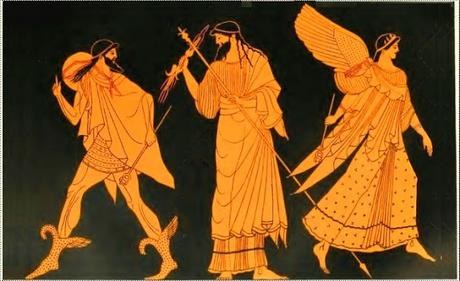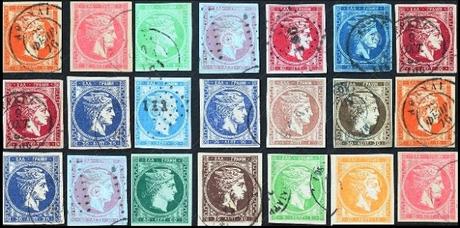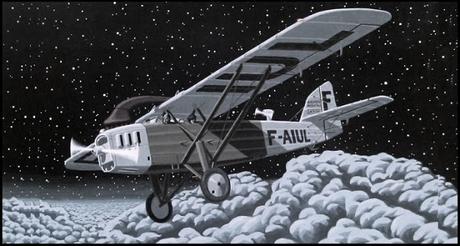That's Hermes as in 'Messenger of the Gods', not the handbag manufacturer. (Sorry if that disappoints, ladies - though the Parisian company was named in recognition of the satchel that Hermes used to carry his dispatches in.) His other epithets include the boundary-marker, the ram-bearer, the trickster, the stealthy. He was a son of Zeus, second youngest of the Olympian Gods; and in addition to his satchel he was famed for his winged sandals, winged cap and winged staff (or kerykeion), all of which are evident in the depiction below.

Hermes (left) being dispatched to Earth
Young Hermes, because of his parentage and duties, was able to move freely between heaven and earth. By day, in addition to running sacred as divine messenger, he was also, by virtue of his constant mobility, the god of boundaries, roads, trade, commerce, travellers, herdsmen, heralds, thieves and tricksters - quite a portfolio. He was well-known as a guide and guardian to both Gods and mortals and a bringer of good luck. He was the divine ally of the Greeks in their war against the Trojans and a particular protector of Odysseus.By night he was the god of social and sexual intercourse, a 'conductor of dreams' and he also served as conveyor of souls to the underworld. Then in his spare time, he invented the lyre (thereby inaugurating the entire lyrical tradition) and many types of sport - running and wrestling among them - which led to him being revered as a patron of athletes and the Olympic games.
As such, Hermes richly deserves his standing among the Olympian Gods in the Hellenic hall of fame. He is one of my favourites, a mercurial and complex character and one of the most enigmatic of divines as well as being the precursor of magicians and jokers.
Over millennia, it is in his role as messenger that he is chiefly regarded; and it was perhaps inevitable that he would feature on Greek postage stamps (as well as those of many other countries) in the pioneering days of modern postal systems and airmail services.

Greek stamps featuring the winged messenger
I've blogged about the exploits of Antoine de Saint-Exupery before and I retain a fascination for the man, his heroic feats as an early aviator and the beautiful books he wrote, by far the least among which is The Little Prince, the work he is most famous for.An aristocrat whose passions from a young age were planes and poetry, St. Ex became a fearless pioneering pilot on the early Aeropostale routes between France and its West African colonies from Morocco down to Senegal (and later down the spine of South America). I'm sure at times he felt that, like Hermes, he was running sacred with his cargo of airmail correspondence, moving faster and more freely than any mortal before him between 'civilisation' and the outposts of the French empire. He navigated by sight during the day (following the coastline of West Africa for the most part) and by the stars at night in aircraft that could prove unreliable and in conditions that were often wildly unpredictable.
As he wrote in his wonderful books, such a trail-blazing lifestyle truly was living on the edge and his brushes with mortality were many. I like to think that Hermes, god of roads, commerce and heralds, was keeping a benign eye on Saint-Exupery's endeavours - as a kindred spirit - and interceding with the fates when required.

Night Flight of the Airmail
My latest poetic effort (still a work in progress) is in tribute to Saint-Exupery and I need to preface it with a quote from Stuart Gilbert (who translated St.Ex's early works Southern Mail and Night Flight into English):"Any fool can find his way, a poet alone knows how to lose it"...
Wing/Prayer
Fragile yet complex as a sycamore vane,
spiralling to ground through Andean cloud
somewhere between starless heaven and hell,
I try to haul this stubborn plane out of another dive
for the love of my life and the precious mail.
The factors which most age a man
are baldness and weight - maybe inconstancy too,
though that's hard to tell from a passing glance.
At least up here I am weightless,
flying-helmet close-fitted to my skull.
In wrestling with this recalcitrant Latecoere
I put out of mind your latest affair,
momentarily consumed with summoning skills
and muttering a prayer on the off chance
as I manage to climb on shuddering wing.
I am contracted to bring orders to commandants,
love letters to lonely hearts at the continent's end,
so like a latter-day Hermes I wend my airy way,
messenger first, man second, happier by far to be
plying these strange skies where I feel free.
Thanks for reading, have a good week. S ;-) Email ThisBlogThis!Share to TwitterShare to Facebook
Reactions:
